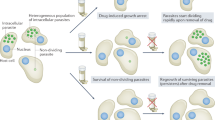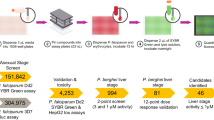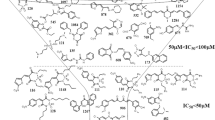Abstract
THE African trypanosomes are unicellular eukaryotic parasites responsible for serious diseases in man (such as sleeping sickness) and domestic animals (such as nagana in cattle). The chemotherapy of these diseases is unsatisfactory1. Only a few drugs are available: these have serious side effects, drug resistance is a problem and “new drugs for clinical use are too expensive to develop and produce”2 using classical empirical screening methods. We report here how knowledge of trypanosome metabolism has led to a new method for screening drugs against trypanosomes. This could provide a short-cut to new drugs or drug combinations.
This is a preview of subscription content, access via your institution
Access options
Subscribe to this journal
Receive 51 print issues and online access
$199.00 per year
only $3.90 per issue
Buy this article
- Purchase on Springer Link
- Instant access to full article PDF
Prices may be subject to local taxes which are calculated during checkout
Similar content being viewed by others
References
Newton, B. A., in Trypanosomiasis and Leishmaniasis with Special Reference Chagas' Disease, CIBA Foundation Symp. No. 20, 285–301 (new series)(Elsevier, Amsterdam, 1974).
Williamson, J., Trop. Dis. Bull., 73, 531–542 (1976).
Vickerman, K., Nature, 208, 762–766 (1965).
Bowman, I. B. R., and Flynn, I. W., in Biology of the Kinetoplastida (edit. by Lumsden, W. H. R., and Evans, D. A.), 1, 435–476 (Academic, New York, 1976).
Fulton, J. D., and Spooner, D. F., Expl Parasitol., 8, 137–162 (1959).
Dixon, H., Nature, 210, 428 (1966).
Opperdoes, F. R., and Borst, P., in Biochemistry of Parasites and Host-Parasite Relationships (edit. by Van den Bossche, H.), 509–517 (North-Holland, Amsterdam, 1976).
Grant, P. T., and Sargent, J. R., Biochem. J., 76, 229–237 (1960).
Opperdoes, F. R., Borst, P., and Fonck, K., FEBS Lett., 62, 169–172 (1976).
Opperdoes, F. R., Aarsen, P. N., Van der Meer, C., and Borst, P., Expl Parasitol. 40, 198–205 (1976).
Ryley, J. F., Biochem. J., 85, 211–223 (1962).
Ackermann, R. H., Bassler, K., and Wagner, K., Z. physiol. Chem., 355, 576–582 (1974).
Clarkson, A. B., Jr, and Brohn, F. H., Science, 194, 204–206 (1976).
Bowman, I. B. R., and Fairlamb, A. H., in Biochemistry of Parasites and HostParasite Relationships (edit. by Van den Bossche, H.), 501–507 (North-Holland, Amsterdam, 1976).
Author information
Authors and Affiliations
Rights and permissions
About this article
Cite this article
FAIRLAMB, A., OPPERDOES, F. & BORST, P. New approach to screening drugs for activity against African trypanosomes. Nature 265, 270–271 (1977). https://doi.org/10.1038/265270a0
Received:
Accepted:
Issue Date:
DOI: https://doi.org/10.1038/265270a0
This article is cited by
-
Regulation and control of compartmentalized glycolysis in bloodstream formTrypanosoma brucei
Journal of Bioenergetics and Biomembranes (1995)
-
Arsenical-resistant trypanosomes lack an unusual adenosine transporter
Nature (1993)
Comments
By submitting a comment you agree to abide by our Terms and Community Guidelines. If you find something abusive or that does not comply with our terms or guidelines please flag it as inappropriate.



